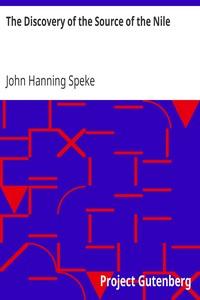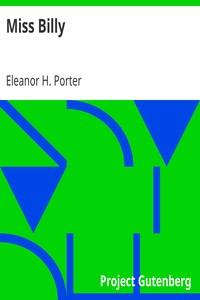Read this ebook for free! No credit card needed, absolutely nothing to pay.
Words: 209397 in 27 pages
This is an ebook sharing website. You can read the uploaded ebooks for free here. No credit cards needed, nothing to pay. If you want to own a digital copy of the ebook, or want to read offline with your favorite ebook-reader, then you can choose to buy and download the ebook.


: The Discovery of the Source of the Nile by Speke John Hanning - Nile River; Africa East Description and travel; Uganda Description and travel; Nile River Valley Discovery and exploration Egypt
THE DISCOVERY OF THE SOURCE OF THE NILE
John Hanning Speke, born 1827. Served in the Punjab but left in 1854 to explore Somaliland. Discovered Lake Tanganyika with Burton, and Lake Victoria independently. Was, with Grant, the first European to cross equatorial africa. Died 1864.
Editor's Note
John Hanning Speke was a man of thirty-six, when his Nile Journal appeared. He had entered the army in 1844, and completed ten years of service in India, serving through the Punjab Campaign. Already he had conceived the idea of exploring Africa, before his ten years were up, and on their conclusion he was appointed a member of the expedition preparing to start under Sir Richard for the Somali country. He was wounded by the Somalis, and returned to England on sick leave; the Crimean War then breaking out, be served through it, and later, December 1856, joined another expedition under Burton. Then it was that the possibility of the source of the Nile being traced to one of the inland lakes seems to have struck him.
Burton's illness prevented him accompanying Speke on the latter's visit to the lake now known as Victoria Nyanza. During this expedition Speke reached the most southerly point of the lake, and gave it its present name. Speke arrived back in England in the spring of 1859, Burton being left behind on account of his illness. The relations between the two had become strained, and this was accentuated by Speke's hast to publish the account of his explorations. He was given the command of another expedition which left England in April 1860, in company with Captain James Augustus Grant, to ascertain still further if the Victoria Nyanza were indeed the source of the Nile. He met Sir Samuel Baker, to whom he gave valuable assistance, and who with his clue discovered the third lake, Albert Nyanza.
Speke telegraphed early in 1863, that the Nile source was traced. Returning to England that year he met with an ovation, and addressed a special meeting of the Geographical Society, and the same year, 1863, published his "Journal of the Discovery of the Nile." Opposed in his statements by Burton and M'Queen , it was arranged that he and Burton should meet for a debate, when on the very day fixed, Speke accidentally shot himself while out partridge-shooting.
Sir R. Murchison, addressing the Royal Geographical Society that year, speaks of Speke's discovery of the source of the Nile as solving the "problem of all ages."
Only two books were published by Speke--the "Journal" of 1863, which follows, and its sequel--"What Led to the Discovery of the Source of the Nile," which appeared in the year of his death, 1864.
Introduction.
In the following pages I have endeavoured to describe all that appeared to me most important and interesting among the events and the scenes that came under my notice during my sojourn in the interior of Africa. If my account should not entirely harmonise with preconceived notions as to primitive races, I cannot help it. I profess accurately to describe native Africa--Africa in those places where it has not received the slightest impulse, whether for good or evil, from European civilisation. If the picture be a dark one, we should, when contemplating these sons of Noah, try and carry our mind back to that time when our poor elder brother Ham was cursed by his father, and condemned to be the slave of both Shem and Japheth; for as they were then, so they appear to be now--a strikingly existing proof of the Holy Scriptures. But one thing must be remembered: Whilst the people of Europe and Asia were blessed by communion with God through the medium of His prophets, and obtained divine laws to regulate their ways and keep them in mind of Him who made them, the Africans were excluded from this dispensation, and consequently have no idea of an overruling Providence or a future state; they therefore trust to luck and to charms, and think only of self-preservation in this world. Whatever, then, may be said against them for being too avaricious or too destitute of fellow-feeling, should rather reflect on ourselves, who have been so much better favoured, yet have neglected to teach them, than on those who, whilst they are sinning, know not what they are doing. To say a negro is incapable of instruction, is a mere absurdity; for those few boys who have been educated in our schools have proved themselves even quicker than our own at learning; whilst, amongst themselves, the deepness of their cunning and their power of repartee are quite surprising, and are especially shown in their proficiency for telling lies most appropriately in preference to truth, and with an off-handed manner that makes them most amusing.
With these remarks, I now give, as an appropriate introduction to my narrative-- An account of the general geographical features of the countries we are about to travel in, leaving the details to be treated under each as we successively pass through them; A general view of the atmospheric agents which wear down and so continually help to reduce the continent, yet at the same time assist to clothe it with vegetation; A general view of the Flora; and, lastly, that which consumes it, Its Fauna; ending with a few special remarks on the Wanguana, or men freed from slavery.
Geography
Free books android app tbrJar TBR JAR Read Free books online gutenberg
More posts by @FreeBooks

: Old Love Stories Retold by Le Gallienne Richard - Biography; Love stories; Heine Heinrich 1797-1856; Authors German 19th century Biography


: Miss Billy by Porter Eleanor H Eleanor Hodgman - Orphans Fiction; Young women Conduct of life Fiction






